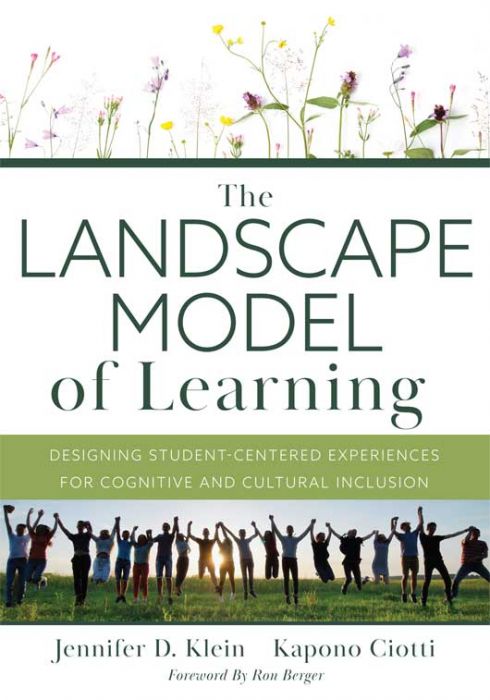
The Landscape Model of Learning
Designing Student-Centered Experiences for Cognitive and Cultural Inclusion
Implement culturally responsive teaching and improve your school culture. By applying the research-based teaching strategies found in this essential guide, you will learn how to create a more meaningful and inclusive learning ecosystem.
Add this eBook to your credit card purchase and gain immediate access.
eBooks are available on desktop, Android, and iOS via Adobe Digital Editions. eBook purchases are limited to one eBook per title, per account. Please visit the eBook FAQ for more information.
Research-based teaching strategies for DEI and school improvement
Help students take the lead on reaching their personal highest level of success by shifting from the current paradigm of education. This essential guide offers the landscape model and its three elements: understanding what students bring to the ecosystem, defining the horizon, and charting the pathway. Access practical strategies for drawing on students’ experiences and strengths to create a more meaningful and inclusive educational ecosystem.
Educators committed to lifelong learning, diversity, equity, and inclusion will:
- Retire the inadequate goal of access and move education toward the higher and more urgent, equitable goal of helping every student reach their highest possible level of individual success
- Embrace the concept of inclusive prosperity, which goes beyond diversity to accepting and supporting all students—their experiences, gifts, and challenges—to build communities where all students belong and thrive
- Receive practical, research-based strategies for developing agency and engagement so that students become the protagonists of their own journeys through the learning ecosystem
- Design systems for student protagonism by implementing student-centered strategies for cognitive and cultural inclusion
- Obtain reproducible tools to deepen understanding and implementation of the material
- Learn how to successfully implement the model despite common hurdles and potential challenges, such as traditional academic contexts and economically disenfranchised schools
Related Topics
Additional Information
“A remarkably inventive approach to how schools can move forward in our increasingly complex times, The Landscape Model of Learning is a must-read for educators. By casting out an ingenious planning trifecta of the ecosystem, the horizon, and the pathway, Jennifer D. Klein and Kapono Ciotti not only inspire dynamic possibilities for our modern students but genuinely generate fresh thinking on how to reimagine our systems, goals, and learning programs. Professionals seeking transformations, whether in small steps or bold moves, should consider integrating the practical ideas and solutions these exceptional authors espouse.”
“Klein and Ciotti have written a book that is both an education manifesto and a practical handbook. The Landscape Model of Learning offers a new vision for education while providing specific steps for implementation and recommendations for leadership. Highly recommended!”
“Efforts to reimagine education tend to focus on how adults operate within the schoolhouse. Gifted educators Jennifer D. Klein and Kapono Ciotti focus instead on learners, valuing their assets, interests, experiences, and aspirations as drivers of more meaningful education. The Landscape Model of Learning challenges readers to chart their own path toward the future that all students deserve.”
“In The Landscape Model of Learning, the authors set high expectations for student learning. They speak from experience and a deep sense of commitment to student learning in its richest form. . . . This is a must-read for all educators.”
“The role of educators is to believe in our students’ potential for growth and help them navigate the path there. The Landscape Model of Learning provides a unique look into how educators can begin this journey of helping students take responsibility for and create their own learning.”
When can I access my eBook? Your eBook will be accessible through VitalSource once your payment has been processed.*
*When using a check or purchase order, the order submitted online will not be processed until Solution Tree receives the check or a copy of the signed official purchase order. Your purchase order must note payment terms of net 30 days. We cannot process purchase orders that do not note these payment terms. Please submit all payments to [email protected].
How do I access my eBook?
To access your eBook:
- Create a free VitalSource account by visiting VitalSource.com. If you already have a VitalSource account, please log in to your account.
- Paste the redemption code that Solution Tree will email you in the “Redemption Code” field on VitalSource.com/Redeem. (Note: You can also access your redemption code within your Solution Tree account under the “eBook” section.)
- Click “Redeem.”
- Enjoy! Once your code is redeemed, your book will be added to your VitalSource Bookshelf and can be read anytime, anywhere.
What are the technical requirements for accessing the eBook? A VitalSource account is required. To sign up for your free account, please visit VitalSource.com.
What if I have trouble accessing my eBook? Please contact VitalSource by emailing [email protected] or by utilizing their Live Chat feature.
What are the shipping and handling costs? There are no shipping or handling costs associated with eBooks. For paperback and hardcover book purchases, standard shipping costs apply. Please visit the Product Orders page for more information on shipping and handling costs.
Can I purchase multiple copies of the same eBook? Bulk orders are not currently available through the website. Website purchases are limited to one eBook per title, per account. If you want to order multiple copies of an eBook, please contact customer support at [email protected].
What if I need to request a refund on my eBook order? RETURN POLICY: We are unable to accept returns or cancel previously placed eBook orders.







